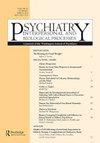The Therapeutic Alliance in Children and Parents.
IF 2.7
4区 医学
Q2 PSYCHIATRY
Psychiatry-Interpersonal and Biological Processes
Pub Date : 2021-01-01
DOI:10.1080/00332747.2021.1932393
引用次数: 0
Abstract
Hilde Bruch, the German-born American pediatrician, psychiatrist, and psychoanalyst, was born in 1904, the third of seven children. Originally planning to be a mathematician, she was convinced by her uncle, who sponsored her education after her father’s death, that medicine was a more practical career choice for a Jewish woman at the time. Receiving her medical degree from the University of Freiberg in 1929, Bruch completed research and training in pediatrics. Ultimately, the rise of antisemitism led Bruch to leave Germany for England in 1933 and then shortly thereafter for the United States. After obtaining her pediatric license in 1935, she sought further study in psychiatry at Johns Hopkins and underwent psychoanalytic training with Henry Stack Sullivan and Frieda FrommReichmann. Hilde Bruch helped rescue her mother and many of her siblings from Nazi Germany, but many of her relatives died there. In 1946, Dr. Bruch adopted her then 13-year -old orphaned nephew. Teaching at Columbia University and later Baylor College of Medicine, Bruch published in the areas of schizophrenia, psychotherapy training, and obesity. She was widely known for her work on eating disorders and obesity. Growing up, Bruch was known as das Dicka – the fat one. In her work with obese children, Bruch “demonstrated that some children . . . were obese because their mothers had overfed and overprotected them.” (Silverthorne & Fulgham, 1997) Her assertion that childhood obesity can have psychological underpinnings ran counter to the medical model of the time. Known as an independent thinker and proliferative writer, Hilde Bruch received many awards for her clinical and written contributions to American psychiatry. Originally printed in Psychiatry, in 1947, Bruch’s “The Role of Parent in Psychotherapy with Children” offers a remarkably enduring perspective on the challenges and rewards of working with parents and children in therapy. Bruch’s writing traces the history of this challenge in child therapy as well as various models of management. She explores many components of the therapeutic or working alliance – the evolution of roles, expectations and attitudes of the parent and clinician – along their shared journey in the treatment of the child. In general, for a patient to trust and work closely with a clinician, it is essential that there be a reality-based relationship outside the conflicted ones for which the patient is seeking help (Friedman, 1969; Rawn, 1991) This working alliance includes both cognitive and affective components. “The working alliance is positively associated with patient adherence, satisfaction, and improved patient儿童和家长的治疗联盟。
本文章由计算机程序翻译,如有差异,请以英文原文为准。
求助全文
约1分钟内获得全文
求助全文
来源期刊
CiteScore
2.70
自引率
0.00%
发文量
48
审稿时长
>12 weeks
期刊介绍:
Internationally recognized, Psychiatry has responded to rapid research advances in psychiatry, psychology, neuroscience, trauma, and psychopathology. Increasingly, studies in these areas are being placed in the context of human development across the lifespan, and the multiple systems that influence individual functioning. This journal provides broadly applicable and effective strategies for dealing with the major unsolved problems in the field.

 求助内容:
求助内容: 应助结果提醒方式:
应助结果提醒方式:


